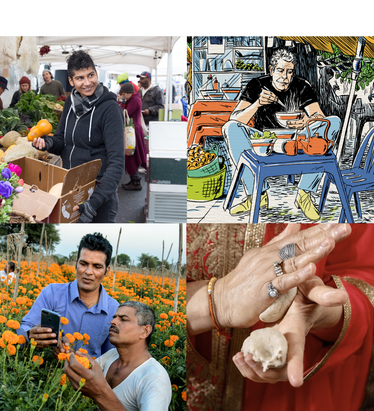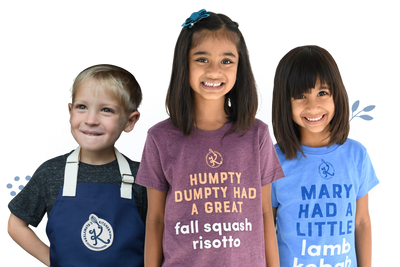
Resources
Delicious Reads: April Roundup
Our April roundup of delicious reads that made their ways into our inboxes, social feeds and minds.
Each month we round up a series of delicious reads that made their ways into our inboxes, social feeds and minds. This month, Kalamata’s Kitchen Chief Imaginator and author Sarah Thomas shares stories from and about the Indian and subcontinental diaspora, and the essential roles of food, representation, and family.
The Covid-19 crisis in India continues to rage in one of the most densely populated countries on the planet. In addition to the articles below, you’ll find a list of resources where you can learn more about what is going on, and donate whatever you can. No amount is too small. There is not a single member of the enormous Indian diaspora who is not somehow affected by what is happening, myself included. In this roundup of articles, I wanted to highlight some of the writers and subjects that give some insight into the vast, dazzling diversity of India’s many food traditions and cuisines. As you read, please consider the people who have contributed to this rich, vibrant food culture and consider sharing whatever you can. Thank you. Please feel free to send me any additional resources you may have. Email me at sarah@kalamataskitchen.com
Covid-19 Aid for India
Bon Appetit: India is in Crisis
KhaanaChahiye: Mumbai is battling hunger along with Covid-19. Again.
Feeding From Far-Ration Distribution Amid Lockdown
Enrich Lives Foundation: The Annapurna movement

In Praise of Aunties: The Ultimate Home Cooks
By Khushbu Shah
Food and Wine
As a person who is eternally grateful for the aunty network, I absolutely loved reading this article about the universality of official and unofficial aunties. Growing up, the Indian families in my very small town were not many in number, but were very close. We all hailed from different parts of the subcontinent, and we were all in each other’s homes multiple times a week, if not daily. I was not related by blood to any of them, but they are closer to me than many actual relatives. In Sathy aunty’s house, I got to eat idli sambar and coconut chutney. In Mumu aunty’s house, we had pani puri parties. In Alka aunty’s house, there was always some delicious baked confection waiting to be devoured. And anywhere I’ve traveled in the world, someone in the extended aunty network has always been there to lend a hand if I needed it, or just feed me (which I always need!). These women are caregivers, keepers of tradition, confidants, and heroes. Long live the aunties, all around the world.

India’s ‘Pickle Queen’ Preserves Everything, Including the Past
By Tejal Rao
New York Times
I read this article last year, and I occasionally revisit it because “Pickle Queen” Usha Prabakaran and her quest to preserve (get it) the past tugs my heartstrings every time. I think it’s safe to say that few Indian tables are ever without pickles of some sort. I grew up with my a dazzling variety of pickles made by my mom, and by the aunties from all over the country as well. While everyone makes pickles in India, as Tejal Rao says in this article, “the only real defining characteristic of India’s pickle culture may be its range.” I love Usha’s humble and sincere approach to the creation and distribution of her book, (in which she limited herself to only 1000 pickle recipes!)—she says she was never interested in actually selling books, but only in “keep[ing] the past alive.” The world needs people like Usha, people are devoted to making sure traditions stay with us for generations. The world would certainly be a less sunny place without her citron pickle recipe.

WhatsApp Is Changing the Way India Talks About Food
By Priya Krishna
New York Times
I remembered this article for a bittersweet reason. These past few weeks, WhatsApp has kept families of the diaspora connected to loved ones back in India, often the only source of updates of any kind, and lately, too many sad ones. I remember reading this a few years ago and being really struck by the massive user numbers of WhatsApp in India, and that it included many members of the aging and older generations. To me this was excellent news—it meant, as this article explains, that recipes could be shared and workshopped in a much more user-friendly way for aunties (a recurring theme in this post!) and grandparents who had never measured or timed ingredients before, but could use the app to really demonstrate the proper way to make their sambar. And what an incredibly valuable resource for organizations trying to share knowledge, recipes, and support within their food communities. It became a democratized platform to share the knowledge of home-cooks, farmers, and others who are less likely to able to or be asked to contribute to blogs, or cookbooks. The food culture would be much less rich without those contributions.

Preeti Mistry on the Enduring Whiteness of Food Podcasts
By Luke Tsai
KQED
Chef Preeti Mistry is one of my favorite people. They have never been afraid to speak out on issues of social justice, particularly in the food industry, and have been constantly and voraciously on the forefront of those battles. While this interview is about their new podcast, Loading Dock Talks, it actually reminded me of another article penned by Preeti themselves, on the biased paradigm of food writing and the harmful effects of creating hierarchies among food cultures, with European food being on top. I was thrilled to learn of Preeti’s new podcast which will contribute to that conversation being an on-going one. Their first guest is another of my favorite people, Asha Gomez, and I really enjoyed reading about Preeti’s excitement around being able to relate and speak to Asha in a way she has likely never been interviewed before.

Missing Travel? This 'Irreverent Guide' Visits Anthony Bourdain's Favorite Places
By Neda Ulaby
NPR
And finally, this article is not in fact about the Indian food experience, but about one of the great inspirations for Kalamata’s Kitchen. I just received my copy of World Travel: An Irreverent Guide, and this article made me even more excited to jump into it. I think it is incredibly powerful that this book gave those closest to Bourdan a chance to commemorate their times together, while still giving all of us who miss his presence another taste of his signature charm, humor, and exposure to the world. I particularly related to the story about Nari Kye, who grew up hiding much of her Korean heritage and identity from her predominantly white, Anglo-American community. It wasn’t till she travelled to South Korea with Bourdain and heard his “full-throated enthusiasm for Korea’s spectacular history, culture, and food” that she felt her own creative potential sparked. It is something wonderful to watch a person realize that the things that make them different also make them special—Bourdain did that for so many adults who had spent their lives hiding parts of themselves. I think Kal and Al will be able to do that for kiddos, who will grow up loving those things and sharing them with the world.
All imagery is sourced from and owned by the original publisher.

